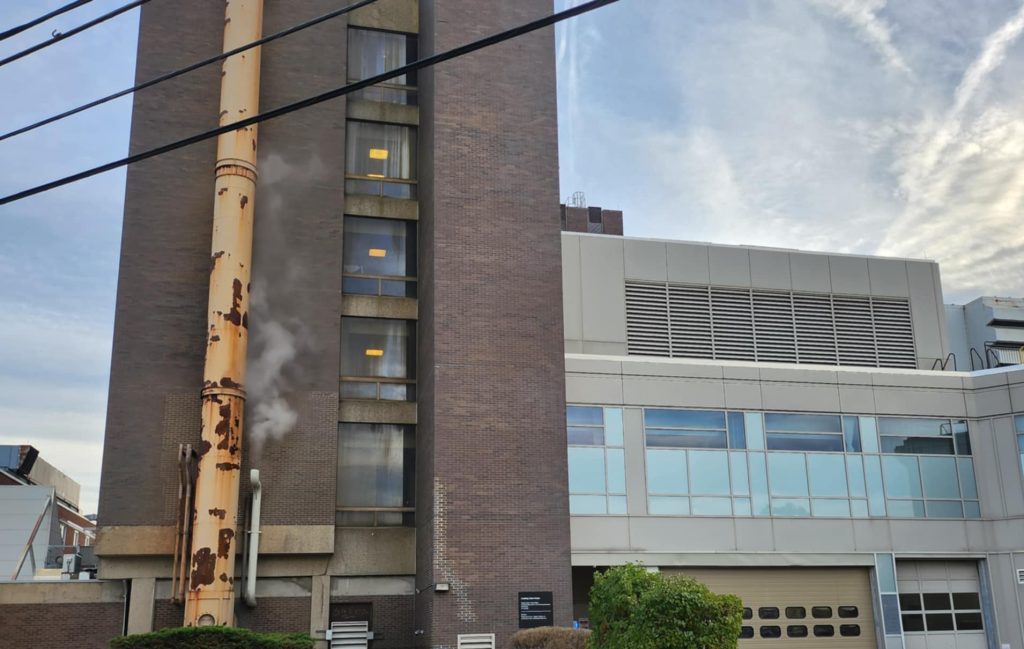[[{“value”:”

By: James Niedzinski
WORCESTER, MA — About 700 medical residents, represented by CIR-SEIU, are in their fifth month of negotiations with UMass Memorial Healthcare.
Residents are working physicians — often more than 80 hours a week and 24-hour-plus shifts in Worcester — that also specialize in specific fields, like internal medicine or pediatrics. Medical residents agree to work for a hospital, generally three-to-seven years, depending on their speciality.
“When patients come to the hospital for an appointment, they are most likely first seen by a resident,” said Dr., Dipavo Banerjee, a psychiatry fellow at UMass and CIR-SEIU regional vice president. “Residents are at the heart of the care that UMass provides.”
What the Union Fights For
According to Dr. Banerjee, medical residents in CIR-SEIU are fighting for three primary points: reinstated contributions to workers’ medical plan, a meaningful increase in pay that reflects the rapidly climbing cost of living in Worcester, and a housing stipend.
As in many cases, workers’ labor battle is not just a battle for workplace conditions.
The Worcester Telegram and Gazette reports that Worcester is the third most competitive rental market and experiencing a severe shortage of Housing Choice Voucher (HCV) to meet the needs of the most vulnerable fixed-income, low-income, and no-income tenants, against a context of no requirement for landlords to accept Section 8 vouchers. Only 52% of people can secure a lease using a Housing Choice Voucher (HCV). That’s down from 93% about eight years ago.
The tenants’ crisis and lack of homes is taking a toll on medical residents, their families, patients and everyone in between, Banjeree said. Maeve O., a second-year resident, right before she met a patient going into labor after speaking with Working Mass, reported:
Honestly, we’re not even asking (UMass Memorial) to pay us what we’re worth, because we know we’re worth far more than what we’re being paid. We’re just asking for the bare basics to cover our cost of living living and necessities.
Medical Residents or Student-Workers?
UMass Memorial management claims medical residents are students, not physicians. Banerjee said:
We are often the first providers patients see when they come to the hospital for an appointment. We wholeheartedly serve as the frontline caregivers for this region’s most vulnerable – caring for the sick, acutely ill, uninsured, and underinsured – while stretching ourselves to fill gaps in staffing and resources that threaten the health of our entire community.
Other institutions that employ student-workers rely on flawed methodology that also ignores the important first provider role performed by residents. But even more broadly, attacks on student-worker rights have increasingly become an arena for labor battle. Earlier this year, Working Mass reported undergraduate workers at Clark University went on strike in their fight for student-worker rights, utilizing tactics informed by challenges to their own classification as workers they anticipated from the NLRB.
UMass management claims they don’t have the funds to cover cost-of-living raises, housing stipends, or medical plan contributions for student-workers. That stance informs UMass’s refusal to meet worker needs. Meanwhile, according to The Boston Globe, UMass CEO Dr. Eric Dickson’s pay increased 26% in 2023 year-over-year, totaling $3.9 million. UMass Medical Center’s former president, Dr. Michael Gustafson, received a 60% raise, during the same time, totaling $2.8 million.
“At this critical time, hospital systems must prioritize putting resources into patient care, not executives’ pockets,” Banerjee said. “When we invest in those who provide care, we protect the patients and communities who depend on us most.”
Management Pushes to the Indefinite Future
A common medical management response is that residents will make much more money once they graduate and finish their residency programs years down the road, resident Maeve O. said. “To me, and a lot of us, it felt like a slap in the face, because my landlord doesn’t care if I’m going to make a lot of money in two years.”
With rising rents, student loans, other costs, and landlords willing to evict, residents can be priced out of the city. Adding a commute on top 80+ hour work weeks can take its toll on worker morale. Patients want a doctor who is healthy and not burnt out and sleep deprived,” Banerjee said. “A fair contract for residents means improvements to our well-being which are inextricably tied to patients and the care we provide them.”
Bargaining sessions have been tough and emotionally challenging, he added. Nevertheless, residents are building solidarity through collective action across medical specialties. Earlier this year, UMass reached a tentative deal with another union, UMass Food and Commercial Workers Local 1445. Banerjee said that collective effort is a path toward reaching an agreement.
And support has also come from other places. On September 30, Worcester City Council officially passed a resolution urging UMass Memorial Healthcare to reinstate health benefits and bargain a fair contract.
As Maeve O. said:
Our hospital admin folks are good people, trying to do good things for the community… with the financial crisis as of late, it’s been kind of easy to put the residents to the side, despite the fact that we’re the ones that are on the front lines, actually helping patients.
James Niedzinski is a member of Worcester DSA and contributing writer to Working Mass.

The post Worcester Medical Residents Persevere Through Fifth Month of Negotiations with UMass appeared first on Working Mass.
“}]]

